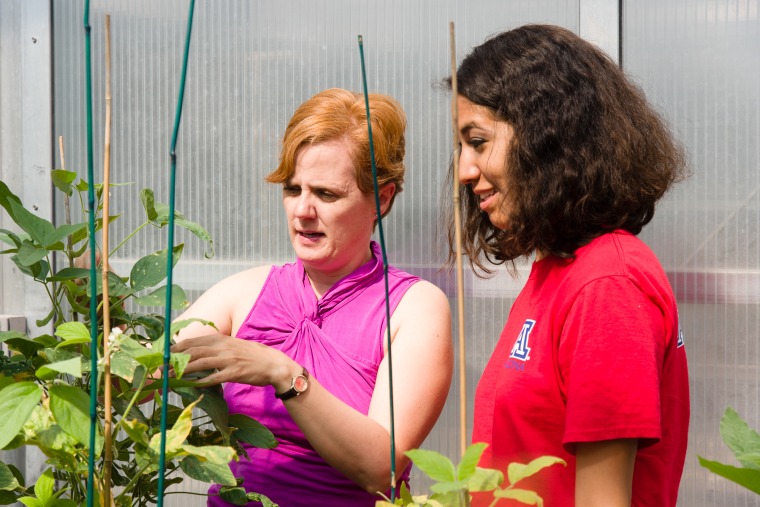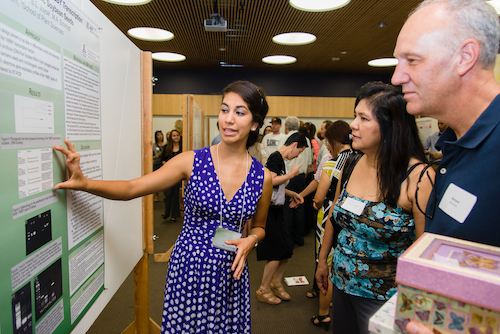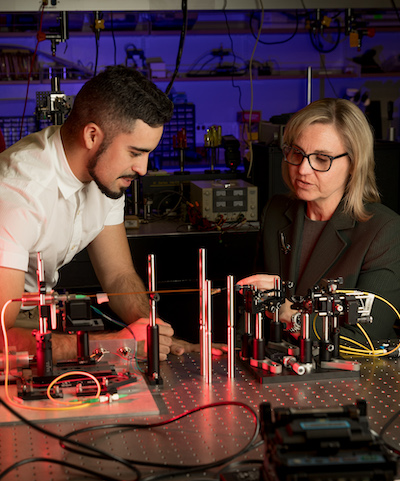
Mentorship is a crucial component of personal and professional development. The relationship is a two-way street – mentors provide feedback, guidance, and resources, while the mentee offers fresh perspectives.
Over the last two decades, the BIO5 Institute has nurtured these mutually beneficial connections that span traditional hands-on research, data science, industry partnerships, and the business, marketing, and communication aspects of a research institute. Many of these opportunities have been facilitated by the Technology and Research Initiative Fund (TRIF) that helped launch BIO5 in 2001.
BIO5 offers students mentorship experiences that complement their academic curricula through internships and paid jobs, as well as post-graduate assistantships.
“Our goal is to help empower students as early as high school and throughout their college education to be fully prepared for successful careers,” said Lisa Romero, executive director of public affairs, communications and engagement for BIO5. “Our approach is about creating meaningful skills, connections and support, while increasing the talent-pool and diversity of students pursuing STEM degrees and careers.”
Additionally, BIO5 leads the annual KEYS Research Internship, one of the state’s premier summer training and mentoring programs for high school students interested in developing STEM skills. KEYS provides interns with real-world research experiences, sparking intellectual and creative curiosity. Students are directly mentored by UArizona faculty members on projects across several disciplines including medicine, engineering, data science and the environment. Interns receive extensive training in bioscience and data science techniques, as well as science literacy. After high school, many KEYS alumni who attend UArizona continue on in their KEYS lab.

KEYS also facilitates near-peer mentorship – KEYS Crew undergraduate students lend personal and professional advice to the interns throughout the rigorous program. Because the high school interns can easily identify with Crew members that are close in age, they are able to receive invaluable support that wouldn’t otherwise be available from mentors who don’t necessarily understand their unique challenges.
Former KEYS intern and 2021 Crew member Gregory Medina-Kenyon says, “There are a lot of things I’ve experienced in my life that help me relate to the interns, like navigating KEYS and being an eccentric person in the sciences, as well as personal aspects like mental illness and not being straight. I wish I had a near-peer mentor who was willing to talk about these things when I was going through them, so I was grateful to be able to provide my guidance and a listening ear to the KEYS interns.”
The BIO5 Institute also provides the infrastructure and financial support for laboratory and computer-based research mentorship. Our more than 300 faculty members welcome undergraduate students into their labs as early as their freshman year, enabling them to apply concepts learned in the classroom to real-world intellectual problems. These direct research mentorship opportunities are common at the University of Arizona, a Research 1 Institution, but rare across the country, providing our students with an educational and professional edge.
The Undergraduate Biology Research Program enhances undergraduate education by partnering with researchers at UArizona to provide opportunities for students to participate in mentored, self-directed work which contributes to new knowledge. Many BIO5 members serve as UBRP mentors, instilling their knowledge and love for research with their trainees. In turn, undergraduate students inspire their UBRP mentors with their fresh perspectives and genuine curiosity for scientific discovery and innovation. BIO5 also provides financial support to the program to help compensate students for their laboratory research.
At the BIO5 Institute, research-based mentorship extends to graduate students, where faculty mentors nurture each student’s transformation into an independent researcher. In turn, graduate students are often paired with one or more undergraduate trainees, enabling them to serve as role models at an early stage in their careers.

BIO5 also facilitates the mentorship and development of postdoctoral scholars. The annual BIO5 Postdoctoral Fellowship awards financial resources and provides guidance to bright postdocs to help the pursuit of their professional goals. Fellows select up to three faculty members to serve on a committee that assists them with grant applications and pursuing the next step in their careers.
Receiving mentoring advice is not limited to students and trainees. The BIO5 External Advisory Board (EAB) is an accomplished and varied group of advisors with life/work experience in drug and device development, regulatory, startups, digital health, government, corporate, healthcare, philanthropy, and beyond. They come from STEM and non-STEM fields, and all are passionate about the mission and impact of BIO5. The BIO5 Institute pairs junior faculty members with EAB members to initiate a dialogue where both sides benefit from an exchange of experience and ideas.
In addition to facilitating STEM-based mentorship, the BIO5 Institute places great emphasis on training and immersing students in the business, marketing, and communication aspects of a research institute.
BIO5 hires many paid undergraduate students who work in administrative support roles that are critical to advancing the research and outreach aims of the institute. Also, the BIO5 Ambassadors Internship allows undergraduates to be mentored in professional development skills like public speaking, marketing, networking, and business etiquette, and learn about the intersection of business and science. Students learn to develop and execute events and programs, as well as produce marketing, communications, and media campaigns.
“The mentorship I received working with BIO5 gave me the tools to pursue new opportunities after I graduated. Even though I was a student with little work experience when I started, my mentors made me feel like an important part of the team and really listened to my ideas. They helped me establish a sense of confidence in myself and my abilities that I did not have when I started,” said Lily Andress, former BIO5 Public Affairs student assistant and 2021 graduate.
About the University of Arizona BIO5 Institute
The BIO5 Institute at the University of Arizona connects and mobilizes top researchers in agriculture, engineering, medicine, pharmacy, data and computational science, and basic science to find creative solutions to humanity’s most pressing health and environmental challenges. Since 2001, this interdisciplinary approach has been an international model of how to conduct collaborative research, and has resulted in disease prevention strategies, innovative diagnostics and devices, promising new therapies, and improved food sustainability.
About the Technology and Research Initiative Fund (TRIF)
The Technology and Research Initiative Fund (TRIF) that helped launch BIO5 in 2001 continues to be a catalyst in enabling effective, cross-disciplinary bioscience research and innovation at the University of Arizona, where initiatives and projects are carefully chosen to align with areas of state and national need. Since 2001, over $50M has been invested in building critical facilities and research services that UArizona is leveraging today to respond to the world’s greatest scientific mysteries. TRIF resources are also instrumental in funding events, programs and grants that promote STEM education, research and literacy.

